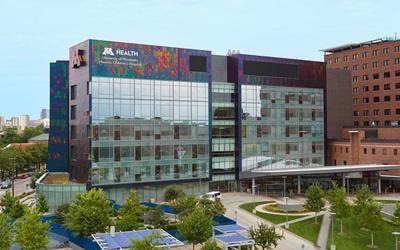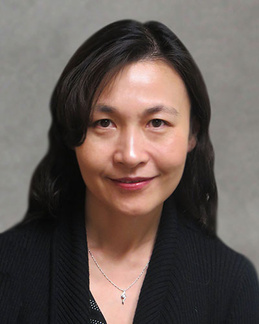Curriculum
Rotations
The Radiation Oncology Residency Program at University of Minnesota is committed to providing comprehensive and individualized training that prepares the residents for a successful career in radiation oncology.
The educational goal for the program and its rotations are referenced to relevant ACGME Core competencies of:
• Patient care
• Medical knowledge
• Professionalism
• Interpersonal and communication skills
• Practice-based learning and improvement
• Systems-based practice
Clinical Rotations (minimum of 36 months)
Residents work one-on-one with a different attending physician every 2 months. Our teaching facilities range from a University-based teaching hospital (University of Minnesota Medical Center), to a community setting (Fairview Lakes and Fairview Maple Grove) as well as the Minneapolis VA Medical Center. Rotating with different faculty physicians at various sites allows for exposure to different interaction styles and a diverse patient population and disease types.
Physics/Dosimetry Rotation (2 months)
Residents are required to spend two months working with medical physicists and dosimetrists. The intent of this rotation will be for the residents to become intimately familiar with standard planning techniques. The residents will be introduced to dosimetry and will be required to participate in the planning of a variety of “standard” cases. Additionally, residents will also participate in the QA of radiation therapy equipment as it applies to clinical practice.
Important areas of focus on this rotation include:
• Plan Evaluation
• Dose specification
• Inhomogeneity corrections (TG-65 https://www.aapm.org/pubs/reports/RPT_85.pdf)
• Plan normalization
• Dose-volume histograms (DVH)
• Monitor unit calculations
• Stereotactic planning and set-up.
• Total Body Irradiation: planning and calculations
• IMRT planning and physics quality assurance
• HDR brachytherapy planning/checks
• Tomotherapy planning and daily QA
• Quality Assurance, Linac QA, Portal Imaging, kVCT
• Daily checks: accelerator and simulator
• Monthly checks: accelerator and simulator
• Quality Management Program (QMP) for brachytherapy
• Physics chart checks
Medical/Pediatric Oncology Rotation (2 months)


Residents are required to complete a two-month rotation in medical oncology and pediatric oncology with colleagues at the Clinics and Surgery Center (CSC) and Masonic Children’s Hospital. Residents serve as members of the clinic team and conduct patient evaluation and follow-up in the Oncology Clinic and participate in oncology conferences. Emphasis is on the clinical evaluation and management of cancer patients and residents are expected to actively participate in all aspects of patient evaluation, treatment and care.
Research Rotation (6 months)
Residents are expected to work on and complete at least one research project during 4 years of training. Up to 6 months of time divided into 3 blocks will be allotted to work on this project. A variety of resources will be provided to facilitate resident research activities, including assistance from our knowledgeable department research administrative team. Once a project is secured, an advisory committee will be formed to keep track of research progress. You can find additional information about research activities in our department and the Medical School on these websites.
Elective Rotation (1 month)
Elective rotation can be arranged based on resident’s interest and may include away rotation, proton rotation (at Mayo Clinic), additional research activity etc.
Didactics and Conferences
Didactic Lectures
Our didactic lectures are held Wednesday mornings 7:30-9:00 and run from mid-August to June. Clinical topics are organized into disease sites and are presented on a two-year rotation basis. Our core curriculum emphasizes case-based approach with each lecture consisting of a 30-minute resident-led literature review followed by a 60-minute faculty-led case discussion. Journal clubs, morbidity and mortality conference, statistics, palliative care are also built into our curriculum. Our academic year ends with a series of one-on-one exams given in ABR oral board style.
Click here to view the didactic schedule for 2022-2023.
Treatment Planning Conference
Our treatment planning conferences are held Mondays and Tuesdays from 7:30-9:00. A unique feature of our conference is the review of contours of all patients treated curatively. Residents should be prepared to present plans of new patients on their service and discuss the rationale for the choice of volume, dose and technique.
Multidisciplinary Tumor Conference
Residents are required to participate in the tumor conference of the disease sites during their rotation. Due to COVID-19, conferences are being held virtually. Here is a list of the multidisciplinary tumor conferences:
|
Mondays |
Time |
Location |
Comments |
|
Rectal Pancreatic CNS |
12:00-1:00pm 12:00-1:00pm 1:00-2:00pm |
Virtual Virtual Virtual |
Every other week Every other week Weekly |
|
Tuesdays |
|||
|
GU Phase 1 Molecular Diagnostic Thoracic Heme Malignancy |
7:00-8:00am 11:00-11:30am 11:30am-12:00pm 12:00-1:00pm 3:30-4:30pm |
Virtual Virtual Virtual Virtual Virtual |
Every other week Weekly 2nd & 4th Tuesday Weekly Weekly |
|
Wednesdays |
|||
|
Acute Leukemia Gyn Onc |
9:00-10:00am 7:00-8:00am |
Virtual Virtual |
4th Wednesday Every other week, odd months only |
|
Thursdays |
|||
|
Sarcoma Gyn Onc |
7:00-8:00am 7:00-8:00am |
Virtual Virtual |
Weekly Every other week, even months only. |
|
Fridays |
|||
|
Breast ENT Hepatobiliary Cutaneous Oncology |
7:00-8:00am 8:00-9:30am 12:00-1:00pm 12:00-1:00pm |
Virtual Virtual Virtual Virtual |
Weekly Weekly Weekly 2nd & 4th Friday |
Useful Resources
Residency Application
The National Resident Matching Program (NRMP)
Electronic Residency Application Service® (ERAS®)
Professional Society
American Society for Radiation Oncology (ASTRO)
Association of Residents in Radiation Oncology (ARRO)
Radiation Therapy Oncology Group
ABR Board Certification
Residency Related Websites
University of Minnesota GME Trainee Evaluation of Faculty
Educational Resources
Radiation Oncology Medical Residency Program Manual (2023-2024)
Contact

Jianling Yuan, MD, PhD
Program Director
yuanm033@umn.edu
Hannah Morrone
Department of Radiation Oncology
Medical and Physics Residency Coordinator
612-624-6433
gytri003@umn.edu